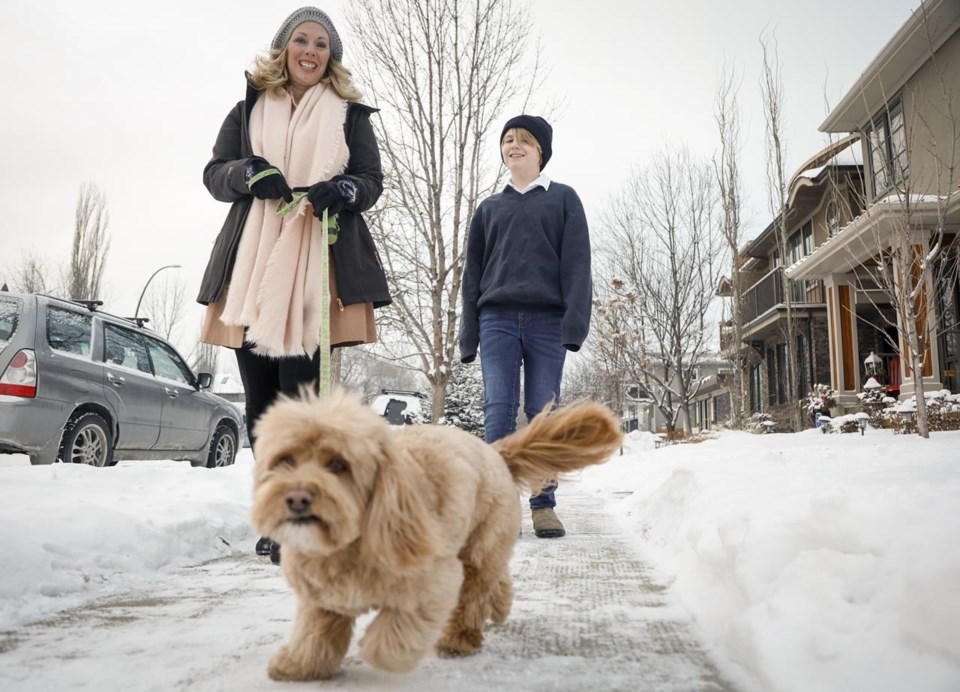EDMONTON — Twelve-year-old Charlie Kozak wasn't feeling safe about having to be in class Monday.
"It's a chaotic mess," Charlie said during a phone interview last week from his home as he prepared to return to his school in Calgary.
"I know some people in my class travelled out of country over Christmas break. Some people have done unsafe family gatherings. We're allowed to take masks off at our desks next to them (that) aren't six feet apart.
"It's unsafe."
While some parents are relieved that students in Grades K-12 are returning to classes after an extended holiday break, many say they are concerned and frustrated about unclear instructions from the Alberta government on how it plans to contain a surge in COVID-19 infections in classrooms caused by the Omicron variant.
The province had analmost 40 per cent positivity rate last week. Education Minister Adriana LaGrange has promised thousands of test kits will be delivered to students and parents over the next few days, but has left it up to schools to report and track infections.
Dr. Deena Hinshaw, chief medical officer of health, has said a return to in-person learning is critical and necessary for students' mental wellness.
"We know the COVID infection has a low — but not zero — risk for children. We also know in-person learning is critically important for many kids' educational and social development and provides a sense of stability and normalcy in these challenging times," she said last week.
Charlie's mother, Dr. Stephanie Cooper, an obstetrician, said she agrees mental well-being is worsening among students, but "mental health is not just about being online or in-person."
"There's a lot of other variables that include the stress of not feeling like you have all the information," she said.
She pointed to a promise made by LaGrange that students will go back to classes with more medical masks.
Schools have received their masks and test kits, but Edmonton Public Schools and the Alberta Teachers' Association have said there are still students who won't get them until days after they return to classes, which could exacerbate the spread of the already highly contagious variant.
"Also, kids can't go outside in Alberta, It's -30 C," Cooper said.
"They're going to take off their masks and eat in a classroom for the lunchtime period. None of this makes any sense. Certainly, a lot of parents are left with a lot of questions as to the logistics of how this is going to happen."
Wing Li, an Edmonton-based parent and a volunteer with advocacy group Support Our Students Alberta, said she will continue tracking outbreaks in schools since the government has stopped contact tracing.
Li said she is able to keep tabs on infections because parents forward letters to her sent by schools reporting an outbreak.
She said she has heard from parents who are relieved their kids are returning to school because they don't have the resources to keep an eye on them and work at the same time.
"I think the narrative is sold that some of us want to shut the school down, but that's not the case at all," Li said.
"We just want safety measures so that it's not a complete disaster."
Edmonton Public Schools has written a letter to the United Conservative government saying that despite the extension to winter break, "our concerns with staffing and division operations have not changed."
The school division, along with the Calgary Catholic School District, have said they are anticipating to once again struggle to find teachers to fill in for those who can't come in due to illness.
Jason Shilling, president of the Alberta Teachers Association, didn't have firm numbers on sick teachers Monday, but heard some schools were scrambling.
"I talked to a colleague who said, 'At our school, we were missing four teachers' so they had to double up classes,'" he said. "Doubling classes concerns me as well because now all of a sudden you go from having 20 to 25 kids in the class to 50 kids."
Shilling added that having 50 students in one classroom would make physical distancing difficult.
Meanwhile, Li said parents and children feel more strain every year the pandemic drags on.
"We know that we have to maintain normalcy for the kids when it hasn't been normal for us at all," he said last week.
"Not having any support adds to that exhaustion and feeling abandoned by policy-makers."
This report by The Canadian Press was first published Jan. 10, 2022.
___
This story was produced with the financial assistance of the Facebook and Canadian Press News Fellowship
Fakiha Baig, The Canadian Press



